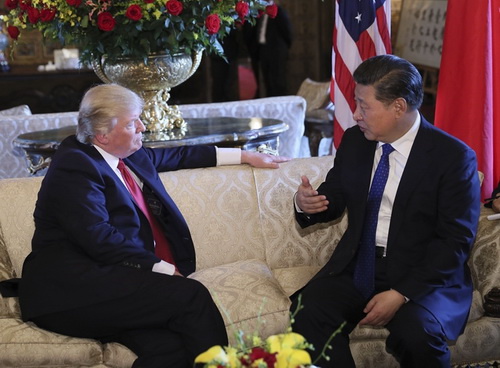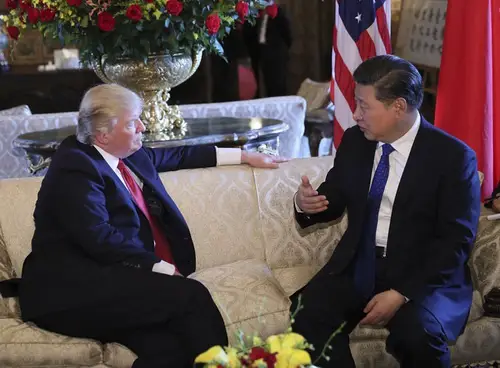By Sun Xihui Source: Global Times, People’s Daily

Chinese President Xi Jinping will meet his US counterpart Donald Trump on Thursday and Friday. Given that the White House's policy toward the Asia-Pacific region has not yet taken shape, Sino-US relations are confronting a myriad of uncertainties. Therefore, the upcoming meeting will be of great strategic significance.
Likewise, US Secretary of State Rex Tillerson's recent trip to China is also a critical step in the development of the bilateral ties between Beijing and Washington. He said Trump was willing to meet with his Chinese counterpart and visit China as soon as possible, and emphasized that Sino-US ties were built on "non-conflict, non-confrontation, mutual respect, and win-win solutions."
Though Tillerson did not directly mention the "new type of major-power relations" in his public speeches, he approved of the phrase and used it to describe Sino-US ties over the past four decades. Tillerson's stance on such an important issue is unlikely a decision he made on his own. It represents that the Trump government has accepted the principle of a new type of major-power relations.
Trump has showed a tough stance on China on many occasions. But the US needs China's involvement in handling a variety of international affairs, given the two countries' intensive economic interaction.
The Trump administration expects to bargain with China by meeting some of Beijing's demands for more cooperation or compromise on the North Korean nuclear issue, the war on terror, trade deficit, currency exchange rate and investment in the US.
Moreover, Trump attempts to create an image of a powerful president. During his campaign, he described himself as the most "presidential" candidate since Abraham Lincoln. In light of the importance of Sino-US ties, his government has recognized the new type of major-power relations and even proposed a 50-year development blueprint for the bilateral relations. This aims at adding bonus points to his presidency and helps him become the US president he projects himself to be.
Trump also needs to properly tackle domestic issues. Known for taking the unpredictable route, he probably intends to gain more domestic support by accepting the new type of major-power relations with China in an "all but Obama" manner.
Common sense has it that the Trump administration's diversion to a positive China policy will be conducive to the stability and development of China-US ties. Nonetheless, the reality will not be as sanguine as expected.
If the White House has changed its attitude based on the mentality of "transactional policy," Beijing and Washington will hold negotiations on a wide spectrum of areas and some sensitive issues will inevitably be discussed. If the results do not meet the expectations of the US side, the Trump administration will probably use scathing words and draconian measures against China once again.
Although the Trump administration may have accepted the new type of major-power relations, it is no more than a superficial gesture. When specific issues come up, the two countries will likely witness more rifts due to conflicting understandings of the connotation of the new type of major-power relations.
Furthermore, some American scholars, media outlets and former government officials aired dissenting opinions immediately after Tillerson declared his "pro-China" stance. Bonnie Glaser, senior adviser for Asia and the director of the China Power Project at the Washington-based Center for Strategic and International Studies, said Tillerson was dead wrong for endorsing China. Daily Kos, a political analysis weblog, questioned whether Tillerson knew clearly that he was making concession to China. Ely Ratner of the Council on Foreign Relations, who served as the deputy national security advisor to former US vice president Joe Biden from 2015 to 2017, said "terms like 'mutual respect' and 'non-confrontation' are code in Beijing for US accommodation of a Chinese sphere of influence in Asia."
These comments are not necessarily the views of the Trump government but demonstrate that there is strong objection to China within the US, which will affect the US' public opinion and its strategic circle to some degree.
If Trump wants to become a better president by stabilizing US-China relations, he is unlikely to send the tensions spiraling. It is believed that Beijing-Washington ties can stay healthy and stable thanks to the concerted effort of the two leaders.
The author is associate professor with the National Institute of International Strategy at the Chinese Academy of Social Sciences.
Likewise, US Secretary of State Rex Tillerson's recent trip to China is also a critical step in the development of the bilateral ties between Beijing and Washington. He said Trump was willing to meet with his Chinese counterpart and visit China as soon as possible, and emphasized that Sino-US ties were built on "non-conflict, non-confrontation, mutual respect, and win-win solutions."
Though Tillerson did not directly mention the "new type of major-power relations" in his public speeches, he approved of the phrase and used it to describe Sino-US ties over the past four decades. Tillerson's stance on such an important issue is unlikely a decision he made on his own. It represents that the Trump government has accepted the principle of a new type of major-power relations.
Trump has showed a tough stance on China on many occasions. But the US needs China's involvement in handling a variety of international affairs, given the two countries' intensive economic interaction.
The Trump administration expects to bargain with China by meeting some of Beijing's demands for more cooperation or compromise on the North Korean nuclear issue, the war on terror, trade deficit, currency exchange rate and investment in the US.
Moreover, Trump attempts to create an image of a powerful president. During his campaign, he described himself as the most "presidential" candidate since Abraham Lincoln. In light of the importance of Sino-US ties, his government has recognized the new type of major-power relations and even proposed a 50-year development blueprint for the bilateral relations. This aims at adding bonus points to his presidency and helps him become the US president he projects himself to be.
Trump also needs to properly tackle domestic issues. Known for taking the unpredictable route, he probably intends to gain more domestic support by accepting the new type of major-power relations with China in an "all but Obama" manner.
Common sense has it that the Trump administration's diversion to a positive China policy will be conducive to the stability and development of China-US ties. Nonetheless, the reality will not be as sanguine as expected.
If the White House has changed its attitude based on the mentality of "transactional policy," Beijing and Washington will hold negotiations on a wide spectrum of areas and some sensitive issues will inevitably be discussed. If the results do not meet the expectations of the US side, the Trump administration will probably use scathing words and draconian measures against China once again.
Although the Trump administration may have accepted the new type of major-power relations, it is no more than a superficial gesture. When specific issues come up, the two countries will likely witness more rifts due to conflicting understandings of the connotation of the new type of major-power relations.
Furthermore, some American scholars, media outlets and former government officials aired dissenting opinions immediately after Tillerson declared his "pro-China" stance. Bonnie Glaser, senior adviser for Asia and the director of the China Power Project at the Washington-based Center for Strategic and International Studies, said Tillerson was dead wrong for endorsing China. Daily Kos, a political analysis weblog, questioned whether Tillerson knew clearly that he was making concession to China. Ely Ratner of the Council on Foreign Relations, who served as the deputy national security advisor to former US vice president Joe Biden from 2015 to 2017, said "terms like 'mutual respect' and 'non-confrontation' are code in Beijing for US accommodation of a Chinese sphere of influence in Asia."
These comments are not necessarily the views of the Trump government but demonstrate that there is strong objection to China within the US, which will affect the US' public opinion and its strategic circle to some degree.
If Trump wants to become a better president by stabilizing US-China relations, he is unlikely to send the tensions spiraling. It is believed that Beijing-Washington ties can stay healthy and stable thanks to the concerted effort of the two leaders.
The author is associate professor with the National Institute of International Strategy at the Chinese Academy of Social Sciences.
 Menu
Menu
 Stable Sino-US ties can aid Trump presidency
Stable Sino-US ties can aid Trump presidency
















